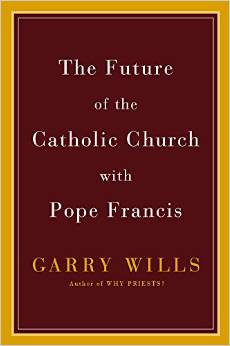 Garry Wills, The Future of the Catholic Church with Pope Francis (New York: Viking, 2015), 263pp.
Garry Wills, The Future of the Catholic Church with Pope Francis (New York: Viking, 2015), 263pp.
By Dan Clendenin
Can the Catholic Church ever change? To those pessimists who say no, says Garry Wills, "it helps not to know much history." It's a fiction to believe that the church has had an immutable past, "that the church was always what it has become." Not true. The church didn't always have priests (a "failed tradition"), or even popes, as we understand them today, or transubstantiation for thirteen hundred years, or papal infallibility for almost nineteen hundred years.
Change is the "respiration" of the church, "its way of breathing in and breathing out." In this book Wills looks at five ways the Catholic Church has changed across the centuries. Latin used to be thought of as a timeless and common language for a universal church, especially in the Latin liturgy (with the priest's back turned to the congregation) and Jerome's Latin Vulgate Bible. When the reign and role of Latin faded away after Vatican II, it was "a proof that the church could change in the right direction after so many centuries of harmful change."
The church's relationship to state power has constantly changed, from persecution, to cooperation, coercion, and compliance. Christian anti-Semitism has been a "tragic absurdity," given that the origins of Christianity were purely Jewish. But genuine progress has been made on this front, including the acknowledgment that the New Testament documents themselves contain anti-Semitic elements. In his discussion of natural law, Wills explores changing views of contraception, patriarchy, and abortion. Radical change has even come to one of the sacraments — penance and confession."There used to be long lines at confessionals on a Saturday before a penitent could go to communion on Sunday. Yet now the confessional boxes are being removed, or used by church janitors to store their equipment."
Wills is both a fierce critic and devoted member of the Catholic Church. He remains optimistic, some readers might say too much so. He believes that Pope Francis knows that the church is not changeless. Rather, he has surprised many people with his words and deeds. He listens to and believes in the laity (the sensus fidelium). Most surprising of all, says Wills, is Francis's admission of "how bad a Jesuit provincial he had been. How often have we heard any pope tell us how wrong he was?" A pope who admits he's been wrong, and who believes in a God of surprises, "bodes well for the future of the Catholic Church."


